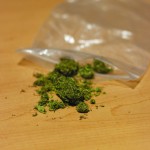
By Ben Markley
Marijuana has been a hot-button issue since the war on drugs began, but with 16 states and Washington, D.C. legalizing medical marijuana, and 12 more (including Kansas and Missouri) pending legislation, the legalization movement seems more potent than ever.
Mark Pedersen, editor-in-chief of the Medical Cannabis Journal, said the effort to legalize marijuana will take more than a signature.
“We have to change the whole dynamic because the way we look at it is wrong,” he said.
Pedersen claimed the most heinous misconception comes from a medical perspective.
“Cannabis is non-toxic,” he said. “I can’t stress that enough. A lot of opponents talk about cannabis as if it is toxic, and too often cannabis advocates play along with that.”
Pedersen stressed that we come into contact with many other substances on a daily basis that are both toxic and legal.
“You get up in the morning, and you have a cup of coffee,” he said. “Guess what? The caffeine in that coffee is toxic.”
Pedersen said cannabis has been effective in treating Parkinson’s disease, Alzheimer’s, dementia and cancer, as well as a number of other medical conditions.
“I’ve personally witnessed cannabis kill cancer,” he said. “I’ve seen it with my own eyes.”
As far as Pedersen is concerned, the fight is half-over.
“It’s not a debate anymore because science is already on our side,” he said.
Rob Amerine, Kansas City representative for Sensible Missouri, said that cannabis had been around for ages in many different forms before it was originally banned in the 1930’s.
“Hemp and marijuana were grown by our founding fathers, including Jefferson, Washington, Benjamin Franklin and many others,” he said. “Our original flag, the Constitution, the Declaration of Independence, they were made of hemp.”
From the colonial times up until the late 1930’s, cannabis and hemp were totally legal substances.
“Some time in the 1930’s, practically every doctor carried marijuana in their little bag for menstrual cramps, headaches and standard operating procedures,” he said.
Pedersen said the reason for banning cannabis had no medical basis. He noted that Harry Anslinger, the man who spearheaded the initial fight against marijuana, was related to William Randolph Hearst, a major player in the paper industry interested in eliminating his primary competition: hemp.
“Hemp is a $200 billion industry in China,” he said. “Imagine if hemp was legal in Missouri, if we only had a fraction of that market.”
Pedersen said the ban was also racially charged, first against immigration from Mexico and later to curb the influence of African American musicians who used the drug during the Jazz Age.
“It was a racial thing basically saying how Mexicans were bringing up drugs that make kids go crazy,” he said. “They made statements that it made black men look at white women. That was everywhere; it was a really popular ad.”
Since then, the governmental stance on marijuana has been harsh.
“Right now it is a Class 1 drug, which is the same as dangerous drugs like crack cocaine and heroin, which is ridiculous,” he said.
Dustin Crews, student, said he preferred that marijuana stay illegal.
“I think it eventually will be made legal, but I really don’t like the smoke,” he said. “I kind of prefer people having to do it in private now. I don’t have to experience it that way.”
Sean Meyer, student, said he thought it was time for a change.
“People say marijuana should be illegal because people abuse it, but you can abuse prescription drugs too, so that doesn’t seem to cut it,” he said.
Amerine said people wanting to get involved with organizations such as Sensible Missouri and the National Organization for the Reform of Marijuana Laws (NORML) would be welcomed as petitioners.
“You don’t have to be a resident of Missouri or even a citizen to pass a petition,” he said. “You have to be a registered petitioner and come to a meeting. It doesn’t take long to explain how to do a petition, but we want to make sure it’s done correctly.”
Pedersen said the needs for the movement in general are simple.
“We need bodies, and we need dollars,” he said. “We’re going for a constitutional amendment, and this is our shot.”
To learn more about the organizations mentioned, visit http://www.kcnorml.org, http://www.sensiblemissouri.org and http://www.show-mecannabis.com.
Contact Ben Markley, sports editor, at [email protected].
Related articles:
The legal effects of marijuana






















[…] Yes we cannabis: Kansas City organizations explain legalization movement […]